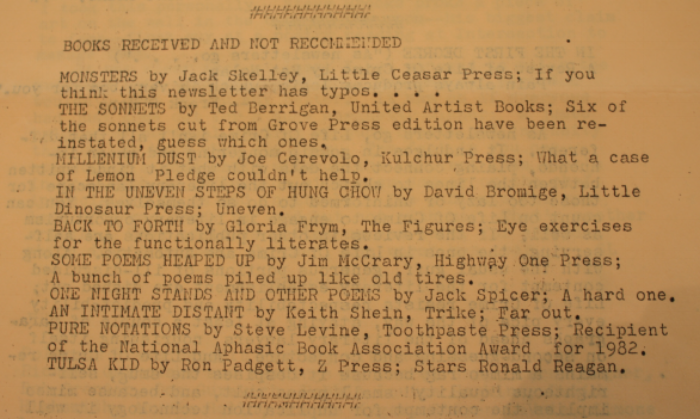Pat Nolan and Steve Lavoie were the editors, or "ediots," as they say, of an underground satirical mimeo Life of Crime, the newsletter of The Black Bart Poetry Society, a real or faux group of poets in open revolt against Language Poetry and any other attendant aesthetic or social "isms." In short, they say, their society is "For those who think poetry is a crime." Named after the infamous "gentleman bandit" Black Bart, Life of Crime was the West Coast cousin to NYC mimeo gossip rag Caveman, the latter of which Alice Notley describes as "a scandalous erratic publication with a complicated history, which satirized Lower East Side and Poetry Project activities and figures." Both publications deeply satirized local and national poetry scenes (and each other), publishing anonymous, gossipy reviews of readings full of comedic vitriol and legitimate gripes; apocryphal, infantile, and scandalous letters to the editor from well-known poets; and all sorts of send-ups of contemporary poetry culture. Full of offensive, witty punch and savage profiles of every aesthetic darling, Life of Crime isn't just a poetry tabloid or pre-internet troll magazine, like the much more recent Claudius App. Though at turns childish, petty, and offensive, Life of Crime is clearly deeply embedded in the social and aesthetic scenes it parodies. Satire is, after all, at the core of the American-English literary tradition. In the context of the current surge in New Narrative scholarship and anthologizing, it would be interesting to read Life of Crime as an additional, contingent space in 1980s Bay Area poetics that, similar to New Narrative, formed in active resistance to and parallel with the rise of the Language poets. New Narrative joyously pillaged high theory and other discourses for alternative prosodies of the body, sexuality, and institutions (spiritual, academic, democratic, capitalistic), renewing various sensibilities in a history of queer writers such as Frank O'Hara and Jack Spicer. On the other hand, the writers behind Life of Crime can claim a direct lineage from Spicer, not from his contested, crystalline aura in West Coast poetics, but from his more vitriolic poems, like the acidic, witty "A Poem for Dada Day at The Place, April 1, 1955" with its vicious, egotistically fraught last lines "You only have the right to piss in the fountain / If you are beautiful." Nevertheless, the "Books Received and Not Recommended" and "Magazines Bound to Fail" lists in an early issue (pictured here) give a sense of Black Bart's parodic range. In "Books Received and Not Recommended" we find purposefully terrible puns, like "MILLENIUM DUST by Joe Cerevolo [sic], Kulchur Press; What a case of Lemon Pledge couldn't help," and the more aesthetically conscious punchline for the United Artists reissue of Berrigan's The Sonnets: "Six of the sonnets cut from Grove Press edition have been reinstated, guess which ones."
The complete text of the Life of Crime newsletter was republished as Life of Crime: Documents in the Guerrilla War Against Language Poetry (Poltroon Press, 2010). I just ordered it today, but these pictures of the newsletter are from the issues I've been studying at Emory's Rose Library. The book's dusk jacket reads:
In the late 1970s a group of San Francisco poets set out self-consciously and methodically in an insurrection of the Yahoos to attack the establishment (academic poets like Robert Lowell, William Stafford, Poetry magazine, the Prairie School, etc.) and promote themselves as a new alternative. They had a Stalinist view of the bourgeoisie and wanted to eradicate the personality from poetry. Yet they yearned for acceptance from the elders, quoting Zukofsky while tearing down their mentors like Ted Berrigan. The threat of L=A=N=G=U=A=G=E P=O=E=T=R=Y appeared overnight. They co-opted reading series such as New Langton Street and Small Press Traffic, promoting a unified front. It was a blatant piece of Junior High bullying and led to a strong reaction from those who refused to join cliques. The voice of the counter-insurgency was a quick and dirty mimeo magazine called LIFE OF CRIME. Editors Steve Lavoie and Pat Nolan enlisted the best satirists in the poetry world (including Andrei Codrescu and Dave Morice) to vilify this vain clique. Others (Tom Clark, David Benedetti, Alastair Johnston) quickly joined the fray. This book includes the complete text of LIFE OF CRIME (Newsletter of the Black Bart Poetry Society: For those who think poetry is a crime). It is guaranteed to turn the stomach of the most prurient literary necrophile.
There's a lot more to be said about what appears in Life in Crime, especially an important, messy narrative from near the end of Ted Berrigan's life. But that's for another time. In other news, Black Bart has been recently revived online, though with less asinine performativity, as The New Black Bart Poetry Society. Check for scandalous updates.
Remembering last year's Literature Since 1900 conference at Louisville when Barrett Watten interrupted Juliana Spahr's keynote speech to correct her about the intentions of the Language poets, here's my favorite Black Bart snippet from today:




